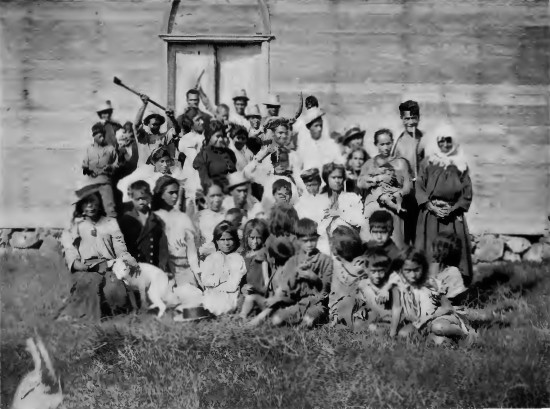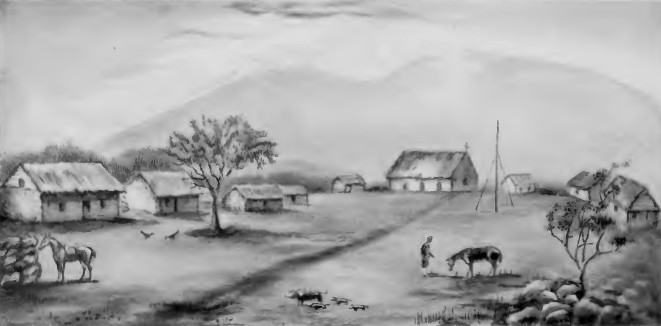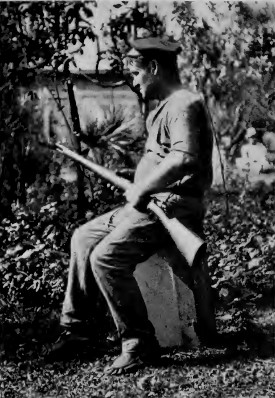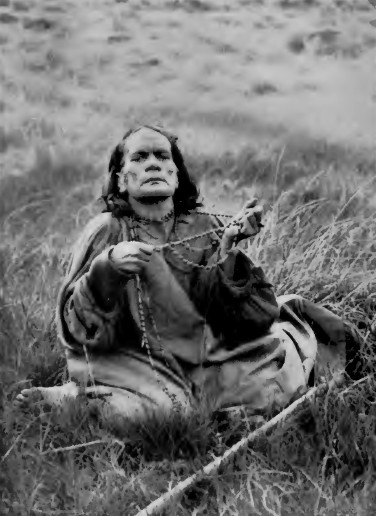| Web
and Book design,
Copyright, Kellscraft Studio 1999-2015 (Return to Web Text-ures) |
 (HOME)
|
| CHAPTER
XI A NATIVE RISING It was
stated a little while back that we were left on the island with statues
and
natives. The statues remained quiescent, the natives did not. The
inhabitants,
or Kanakas to give them their usual name1 (fig. 26), are on
the
whole a handsome race, though their voices, particularly those of the
women,
are very harsh. They are fortunate also in possessing attractive
manners, from
which they get the full benefit in their intercourse with passing
ships. The
older people we found always kind and amiable, but the younger men have
a high
opinion of their own merits, and are often difficult to deal with.
Their
general morality, using the word in its limited sense, is, in common
with that
of all Polynesians, of a particularly low order; it is true that the
Europeans
with whom they have come into contact did not initiate this condition,
but they
have seldom done anything to show that that of their own lands is in
any way
higher; a fact which should be remembered when complaint is made that
Kanakas
"have no respect for white men." The native love of accuracy also
leaves a good deal to be desired, and their lies are astonishingly
fluent; but
lack of truthfulness is scarcely confined to Kanakas. In common with
all
residents in the South Seas, or indeed elsewhere, they exert themselves
no more
than is necessary to supply their wants; unfortunately these, save in
the
matter of clothes, have scarcely increased since pre-Christian days.
The
food-supply of sweet potatoes and bananas, with a few pigs and fowls,
can be
obtained with a minimum of labour; the keeping of sheep and cattle is
not
permitted by the Company, owing to the impossibility of discovering or
tracing
theft. Their old huts, which were made with sticks and grass, have been
replaced by small houses of wood or stone, but, except in a few cases,
there is
no furniture, and the inhabitants continue to sleep on the floor, in
company
with hens, which freely run in and out (fig. 27). There seems no desire
to
improve their condition; "Kanakas no like work, Kanakas like sit in
house," was the ingenuous reply given by one of them, when my husband
pointed out the good results which would accrue from planting some
trees in
village territory.  FIG. 26. — A GROUP OF EASTER ISLANDERS OUTSIDE THE CHURCH DOOR  FIG. 27. — HANGA ROA VILLAGE Native houses and church. Rano Kao in the distance. We had
heard in Chile rumours of native unrest, owing to the action of a white
man,
who had been for a short while on the island, and who had done his best
to
undermine the authority of the manager. We had before long unpleasant
evidence
that they were out of hand. The wool-shed, which contained our minutely
calculated stores, was broken into, and a quantity of things stolen,
the most lamented
being three-fourths of the stock of soap; no redress or punishment was
possible. On June 30th, while we were still at the manager's, a curious
development began which turned the history of the next five weeks into
a
Gilbertian opera — a play, however, with an undercurrent of reality
which made
the time the most anxious in the story of the Expedition. On that date
a
semi-crippled old woman, named Angata (fig. 30), came up to the
manager's house
accompanied by two men, and informed him that she had had a dream from
God,
according to which M. Merlet, the chairman of the Company, was "no
more," and the island belonged to the Kanakas, who were to take the
cattle
and have a feast the following day.2 Our party also was to
be laid
under contribution, which, it later transpired, was to take the form of
my
clothes. Later in the day the following declaration of war was formally
handed
in to Mr. Edmunds, written in Spanish as spoken on the island: "June
30th, 1914. "Senior
Ema, Mataveri, "Now
I declare to you, by-and-by we declare to you, which is the word we
speak
to-day, but we desire to take all the animals in the camp and all our
possessions in your hands, now, for you know that all the animals and
farm in
the camp belong to us, our Bishop Tepano gave to us originally. He gave
it to
us in truth and justice. There is another thing, the few animals which
are in
front of you,3 are for you to eat. There is also another
thing,
to-morrow we are going out into the camp to fetch some animals for a
banquet.
God for us. His truth and justice. There is also another business, but
we did
not receive who gave the animals to Merlet also who gave the earth to
Merlet
because it is a big robbery. They took this possession of ours, and
they gave
nothing for the earth, money or goods or anything else. They were never
given
to them. Now you know all that is necessary. "Your
friend, "Daniel
Antonio, “Hangaroa,"
If some
of the arguments are probably without foundation, as, for example, that
regarding native rights in the cattle, they were at least, as will be
seen, of
the same kind which have inspired risings in many lands and all ages.
The
delivery of the document was immediately followed by action. The
Kanakas went
into “the camp” eluding Mr. Edmunds, who had gone in another direction,
and
secured some ten head of cattle. The smoke from many fires was shortly
to be
seen ascending from the village, and one of our party was shown a beast
which
was to be offered to us in place of our stolen property, “God" having
apparently reversed his message on the subject of our contribution to
the new
republic. The next few days there was little more news "from the
front," save that Angata, the old woman, had had another dream, in
which
God had informed her that "He was very pleased that the Kanakas had
eaten
the meat and they were to eat some more." A week later, riding home
through the village, I saw a group on the green engaged in dressing a
girl's
hair; on inquiry it was found that she was to be married next day.
Congratulations had hardly been expressed, when another young woman was
pointed
out who was also to change her state at the same time, and another and
another,
till the prospective brides totalled five in all. The idea, it seemed,
was
prevalent, that if punishment was subsequently inflicted for the raids,
it was
the single men who would be taken to Chile, hence this rush into
matrimony,
undeterred by the fact that Mr. Edmunds, in his capacity as Chilean
official,
had declined for the present to perform the civil part of the ceremony.
The
wedding feast was, of course, to be furnished by the sheep of the
Company.
Unfortunately, under such circumstances, it seemed hardly loyal to our
host to
attend the multiple wedding, which was duly solemnised in the church
next day. Meanwhile,
the white residents had, of course, been considering their position,
and in
orthodox fashion, counting the number on which they could rely in an
emergency.
Beside Mr. Edmunds there were at this time in our party, myself and
five men:
S., Mr. Ritchie, the photographer, the cook, and a boy from Juan
Fernandez.
There were about half a dozen more or less reliable Kanakas, including
the
native Overseer and the village Headman, but everyone else was
involved. Mr.
Edmunds's position as custodian of the livestock was unenviable, and
ours was
not much more pleasant. After much thought we strongly dissuaded him
from
taking any action; if he interfered, there would be an affray. The
natives were
said to have a rifle and some pistols; it was doubtful how many would
go off, but
there would anyway be stone-throwing: if he was then forced to shoot,
the only
deterrent possible, he would have to continue till resistance was
entirely
cowed, or all our lives would remain in danger. His personal safety was
however
another matter, and our party therefore accompanied him in an attempt
to
frustrate a raid, but this obviously could not be continued if our work
was to
be accomplished. We were strengthened in adopting a waiting policy by
the fact
that, most fortunately, a fortnight earlier a passing vessel had left
us
newspapers; they confirmed the news heard in Chile that the naval
training-ship, the Jeneral Baquedano,
whose visits occurred at intervals of anything from two to five years,
was
shortly leaving for Easter Island. We could only hope her arrival would
be
soon.  FIG 28. — BAILEY, THE COOK, ON GUARD S.
suggested that, being an unofficial person, he might meanwhile try the
effect
of negotiations; for the raids were continuing, and the head of cattle
killed
on one day had risen to fifty-six, including females and young. He
therefore
went down to the village, assembled the natives, and offered the
company a
present of two bullocks a week, if they would refrain from taking any
more
stock till the arrival of the warship, when the whole matter could be
referred
to the captain. The audience laughed the suggestion out of court, for
“the
whole of the cattle," they said, belonged to them, as God had told
Angata,
but they would let our party “have twenty" if we wished; as for Mr.
Edmunds, “he is a Protestant, and therefore, of course, has no God."  FIG 29. — EASTER ISLAND WOMEN When my
husband returned saying he had accomplished nothing, I felt that it was
"up to me." "This," I said, “is a matter requiring tact,
and is therefore a woman's job; I
will go and see the old lady." I had already received from her an
embarrassing present of fowls, which, after referring the matter to our
host,
it had seemed better to accept. Not without inward trepidation, I rode
down to
the village, taking the Fernandez boy as interpreter, for many of the
natives
speak a smattering of Spanish. The place was a perfect shambles, joints
of meat
hanging from all the trees, and skins being pegged out to dry on every
hand,
but the raiders had been displaying energy in rebuilding the wall round
the
church. The Prophetess was with a group outside the house of the acting
priest,
who was her son-in-law; she was a frail old woman with grey hair and
expressive
eyes, a distinctly attractive and magnetic personality. She wore
suspended
round her neck some sort of religious medallion, a red cross, I think,
on a
white ground, and her daughter who supported her carried a small
picture of the
Saviour in an Oxford frame. She held my hand most amiably during the
interview,
addressing me as "Caterina." I had brought her a gift and began by
thanking for the fowls. She refused all payments, saying "Food comes
from
God, I wish for no money," and proceeded to offer me some of the meat.
This gave an opening, and in declining I besought her not to let the
Kanakas go
out again after the animals, for Mr. Edmunds said he would shoot if
they did,
and there would be trouble for them when the Baquedano
came. As I spoke of the raids her face hardened and her
eyes took the look of a fanatic; she said something about "God" with
the upward gesture which was her habit in speaking His name. I hastened
to
relieve the tension by saying that “We must all worship God," and was
happy to find that I was allowed a share in the Deity. Her manner again
softened, and looking up to heaven she declared, with an assured
confidence,
which was in its way sublime, “God will never let the Kanakas be either
killed
or hurt." The natives were, in fact, firmly persuaded that no bullet
could
injure them. As for myself, Angata would, she said, “pray" for me,
adding,
with a descent to the mundane, that if ever she had "chickens or
potatoes," I should be the first to have them. It was impossible to
reason
further; we parted the best of friends, but the "tactful" mission had
failed! This was
the state of affairs when we decided that we must transfer our work and
consequently our belongings to the other end of the island. Our
surveyor and
photographer remained, however, at Mataveri, as the accommodation there
was
more convenient for their occupations, so Mr. Edmunds was not alone.
Moving
camp, levelling ground, and building walls, were not light matters,
when the
Kanakas had found such much more interesting employment, but at last it
was
accomplished, and then came the question of the stores, which after the
robbery
at the woolshed had been taken to Mataveri. After much consultation it
was
decided to remove them to Raraku, as on the whole safer than leaving
them at
the manager's house, which might, by the look of things, be any day
looted or
burnt down. But when the ox-cart had been carefully loaded up with the
numerous
boxes and goods, the cash supply, consisting of £50 of English gold and
some
Chilean paper, being carefully hidden amongst them, a spell of bad
weather set
in. It was impossible to move the cart, and our possessions sat there
day after
day most handily arranged for the revolutionists if their desires
should turn
that way.  FIG 30. — ANGATA, THE PROPHETESS. Our new
camp we were often obliged to leave without defence save for the
redoubtable
Bailey, who had also served as guard at Mataveri (fig. 28). There had
been no
demonstration against us so far, but of course the future was unknown,
and I
never came in sight of our house, on returning from any distant work,
without casting
an anxious glance to see if it were still standing. We always went
about armed,
and the different ranges for rifle-shot were measured off from my house
and
marked by cairns, which will no doubt in future add yet one more to the
mysteries of Easter Island. One day I
had just come back from a stroll, when the cry was raised "The Kanakas
are
coming," and a troop of horsemen, about thirty strong, appeared on the
sky-line some four hundred yards distant. Fortunately S. was at hand,
we
hurried inside my house, shut the lower half of its door, which
resembled that
of a loose-box, and carelessly leant out. Any unpleasantness could then
only be
frontal; at the same time all weapons were within easy grasp, though
not
visible from the outside. It soon,
however, became clear that the visitors were approaching at a walk
only, from
which it was gathered their intentions were friendly. Nevertheless it
was a
relief when, as they got nearer, they raised their hats and gave a
cheer; they
then formed a semi-circle round the door and dismounted. The "priest"
who was with them, and who carried a picture of the Virgin, read
something,
presumably a prayer, at which the company crossed themselves. He then
gave
greetings from Angata, and a message from her to say that Mana
was returning safely with letters on board, and the men
presented from their saddle-bows, eggs, potatoes, and about a dozen
hens. The
position was unwelcome, but as none of the goods were stolen, it seemed
better
to accept, and discharge the obligation as far as possible by giving in
return
what European food we could spare. We
subsequently informed Mr. Edmunds, and sent a message to the Prophetess
that,
as our camp was out of bounds, the Kanakas must not come without leave.
The old
lady herself, however, kept sending to us for anything she happened to
want,
and as the requests continually grew in magnitude the breaking-point
seemed
only a question of time. One of the earlier demands, to which Mr.
Edmunds
thought it advisable we should accede, was for material for a flag for
the new
Republic; later, it floated proudly as a tricolour, made of a piece of
white
cotton, some red material from the photographic outfit, and a fragment
of an
old blue shirt. Elsewhere
things went from bad to worse, and it seemed as if the expected warship
would
never arrive. Word came that the Kanakas had ordered the native
overseer to
leave his house, the only one outside the village, and were taking away
the
servants of the manager; our photographer wrote that he "dared not come
over as their lives were being threatened"; and finally, one afternoon
we
received a note from Mr. Edmunds, saying, that "he could not leave the
place as the Kanakas were talking of coming up in a body to the house."
They were also, as we later learnt, threatening to kill him if he
resisted
their taking possession. It was obvious that the crisis had arrived;
that we
must risk leaving the camp and go into Mataveri. We talked over every
conceivable plan of campaign, but it was too late to do anything that
night, and
I remember that, finally at dinner, to turn our thoughts, we discussed
the
curious manner in which some of the statues had fallen. In four cases
which we
had seen that day, while the body lay on its front, the head had broken
off in
mid air, turned a complete somersault, and rested on its back with the
crown
towards the neck. The next morning, August 5th, I awoke early and
recorded in
my journal the events of the day before. “Of course," I added, “if it
were
a stage play, just as the crisis arrived there would be cries of ‘the Baquedano is here,' and the curtain
would fall. But, alas! it is not." Scarcely was the ink dry — only it
was
pencil — when a man rode up waving a note from Mr. Edmunds, and
shouting, “A
ship! — a ship!” The previous afternoon, as the Kanakas were assembling
in the
village to go up to Mataveri, the Baquedano
had been sighted, and four of the ringleaders were now in irons. I
scarcely
knew how great had been the long strain till the relief came. Our
rejoicings, however, we found to have been partly premature. The
warship had
unfortunately brought with her large gifts of clothes for the natives
from
well-wishers in Chile. Some little while before attention had been
'drawn to
the inhabitants of Easter, by an Australian captain who had touched
there on
his homeward voyage. The natives had, as usual, come off to his ship in
their
oldest garments; he had been impressed with their ragged condition and
made a
collection of clothes for them in Australia amounting to many bales,
but on his
next voyage to Chile he had been unable to touch again at the island
and had
left them at Valparaiso. We had been asked to bring these bales, but
had
declined on the score of space.4 The Chileans disliked the
idea of
their protectorate being indebted to strangers, made a collection on
their own
account, and despatched them by the Baquedano.
It seemed unthinkable that people, every one of whom for weeks had been
consuming stolen goods, and who, two days before, had been on the verge
of
murder, should be immediately presented officially with the commodity
they most
prized. I therefore went on board the Baquedano,
saw the Captain, and ventured to request that the goods should be
handed over
to us, promising personally to visit every house before our departure,
ascertain
the needs of the people, and distribute the articles. “Surely," he
said, “you
shall have them." Within a few hours they had been distributed by his
officers on the beach. Some of the garments were useful, but an
assortment of
ball-slippers seemed a little out of place, and the greater part of the
community, men and women, blossomed out into washing waistcoats. The
stolen
sheepskins, or some of them, were returned, but three of the four
ringleaders
were set at liberty, and no corporate punishment was inflicted; indeed,
the
Captain had told me he considered that the natives had “behaved very
well not
to murder Mr. Edmunds" prior to our arrival. Before
the ship left the island, the Captain wrote officially to the "Head of
the
British Scientific Expedition" to the effect, that the action he had
been
obliged to take to restore order would probably have the result of
rousing more
feeling against foreigners; he therefore could not guarantee our safety
and
offered us passages to Chile — an offer which, needless to say, we
declined. So
ended the Revolution; we felt with interest that the confidence of the
Prophetess had been justified, at any rate as far as 249 Kanakas were
concerned
out of the 250. The old
lady died six months later; I attended her funeral. The coffin was
pathetically
tiny, and neatly covered with black and white calico. A service was
first held
in the church where, during the rising, she used to take part in the
assemblies
and address her adherents. There figured prominently in the ceremony a
model of
the building and also two prie-dieu, roughly made of boards, one of
which she
had used in private, the other in public worship. She was laid to rest
beneath
the great wooden cross, which marks the Kanaka burying-ground, between
the
village and the bay. I stood at a little distance watching gleams of
sunshine
on the great stones of the terrace of Hanga Roa and on the grey sea
beyond, and
musing on the strange life now closed, whose early days had been spent
in a
native hut beneath the standing images of Raraku. My attention was
recalled by
an evident hitch in the proceedings: difficulty had arisen in lowering
the
coffin, owing to the fact that the prie-dieu was also being fitted into
the
grave. When all had been finally adjusted and the interment was
completed, a
sound was heard, unusual in such circumstances — three English cheers —
hip,
hip, hooray; the natives had learnt it from passing ships and esteemed
it an
essential part of a ceremony. The company was not large for the
obsequies of
one who had so recently been the heroine of the village, and on asking
in
particular why a certain near relative was absent, the answer received
was that
"there was to be a great feast of pigs, and he was busy preparing it";
doubtless others were similarly detained. During
the remainder of our sojourn there were, as will be seen, additional
white men
on the island. The Kanakas were occupied in various ways and there was
no
further open demonstration, but their independence and demands
increased daily.
Since we left, a white employee of the Company has been murdered by
them and
thrown into the sea. 1
"Kanaka" is a name originally given by Europeans to the inhabitants
of the South Seas, and is one form of the Polynesian word meaning
"man" 2 The
natives of Easter hold very firmly the primitive belief in dreams. If
one of
them dreamt, for example, that Mana
was returning, it was retailed to us with all the assurance of a
wireless
message. 3 The
milch-cows. 4
Considerably later Mana was again
approached on the subject of the Australian gifts, and Mr. Gillam
consented to
bring them; it then transpired that they were no longer available,
having
"been given by the wife of the head of the Customs to the deserving
poor
of Valparaiso." |